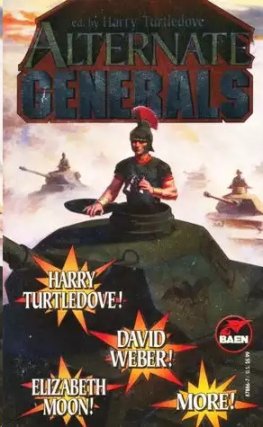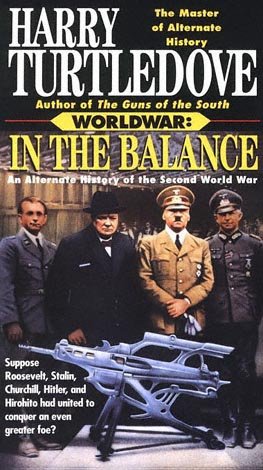Harry Turtledove (Editor)
Alternate Generals III
Once Again, Great Leaders Make Great History
but Not History as We Know It. .
History shows that leadership is crucial in war, but there are other factors at work. What if history were given a twist or two, and great commanders on land and sea fought their greatest battles under different circumstances?
Suppose General Douglas MacArthur had been captured before he could escape from Manila and became a prisoner of war?
Suppose Joan of Arc had not been burned for heresy and had gone on to lead France to very different victories?
Suppose Genghis Khan had been a convert to Judaism and his horde had fought for a different cause than in our universe?
Turtledove and his colleagues turn the past upside down and inside out, and the possibilities are endless. .
ABOUT THE AUTHOR
Hugo-winner, New York Times best-selling author, and historian-Harry Turtledove is equally renowned in science fiction for his rigorously thought-out alternate history novels and in fantasy for his tales of the supernatural placed in historically accurate settings. For Baen, he has written the alternate American Civil War fantasy trilogy comprising Sentry Peak, Marching Through Peachtree, and Advance and Retreat, as well as The Case of the Toxic Spell Dump, and the popular Gerin the Fox series, Wisdom of the Fox and Tale of the Fox. He has also authored the Ingram bestseller Guns of the South and the genre bestsellers in the World at War series for Del Rey.
A Key to the Illuminated Heretic
A. M. Dellamonica
Frontispiece: Joan of Arc stands chained in a horse-drawn wagon, wearing a black gown. Leaning against a pair of nuns, she seems almost to swoon. Her right arm is portrayed as bones without flesh. The horses' ornate curls and gleaming teeth lend a ghastly note, and blackened angels border the image.
The scene is easily recognized: the Maid's debilitation, the nuns, and especially the cloud of larks above serve to identify it as Joan's journey to the trial that ended her thirteen-year imprisonment for heresy. It was at this "Exoneration Trial" that she encountered Dulice Aulon, the Jehanniste artist responsible for the holy pictures on which the codex illuminations are based.
* * *
"We mustn't face the king in battle." Joan had the light, clear voice of a young woman, even after her years in prison and the hard decade since her release. She'd asked one of the new archers, a girl of perhaps seventeen, to cut her hair, and a few broken strands of silver hair clung to her neck. The rest lay at her feet, bright in the glow of dying fire.
"Not fight Charles?" Hermeland was incredulous. He was a badger of a man, with a dramatic, pointy face and remarkable speed with a sword. "We must turn his army back before it unites with the force of mercenaries coming up from Rome. If you can't see that-"
"Can't see it? Who ordered us to turn north, days before anyone knew the king had pursued us into Burgundy?"
"You-" he began, and as her brow came up he corrected, "your Voices."
They were nearly of a height, less than perfect subjects for a drawing. From her seat in the shadowed corner of the tent, Dulice tried to capture the dirt on Joan's blue tunic and leggings, her sheathed knife of a body. She was all deadly intent, a knight with a lined face and too many scars. Her eyes blazed-it was a wonder Hermeland did not flinch from the heat there!
"What I do not see is why Charles is coming at all," she said. "He's an old man. He never led men-at-arms before."
"Politics," he replied. "So says Marcel Renard."
"He would bring that filthy word into it." She waved off the archer gently, shaking out her shorn locks as the girl left.
"We can win this battle, Joan," Hermeland said.
"We would win." She dismissed the issue as she took up her sword. "But God did not have me crown this king only to tear him down."
She had no doubt at all, and it was plain Hermeland was surprised. Misunderstanding Joan as usual, Dulice thought-he thinks she fears defeat, but it is victory that worries her.
Dulice herself didn't share their belief in the small Jehanniste army-or even, sometimes, in the Maid's heretical faith. Her uncle had been Joan's squire, years ago, in the fight against England and Burgundy. He had brought Dulice with him to the Maid's Exoneration Trial, and Joan spotted her in the crowd. She'd been drawing the scene on a scrap of vellum. Perhaps because Joan couldn't read, the image had captured her as firmly as the making of it gripped young Dulice.
Joan had adopted the girl on the spot, keeping her close ever since. Her need for a record of her doings was so strong she never questioned whether her handmaiden's truest love was for God or merely for pen and page.
"If we stay this course we will meet Charles," Hermeland pressed. "Then we'll fight, ready or not."
"I'm telling you, we must pray for-"
"Joan, an army that does nothing but pray is just a moving monastery!" he thundered.
Her chin came up. "And an army that never prays?"
"Emerges victorious, probably." He strode from the tent, stomping off into the sound of men breaking camp-low conversations, the snorts of horses and the groans of wagons being loaded. Birdsong rose above the murmur of preparation. The air was mild and damp; it had rained the night before.
"No time for Mass this morning," Dulice said, making herself noticed for the first time.
"We'll say a quick one now, just us two." Stretching, Joan raised her sword in an attack pose, spearing an invisible enemy through the chest. "Will there be churchbells ahead?"
"We might hear Autun. And there's a monastery east of there Saint Benoit? If we keep this direction, you might hear one or the other ringing Vespers tonight." She was happy to give the answer-Joan loved bells, for they often brought her Voices to her.
"Of course we will march," Joan said. For just an instant she sagged, and the younger woman saw the chasm of years between them. "God set us on this path, not me."
Dulice teased out the piece of paper, translated the words into Latin, and wrote them at the bottom of the page as Joan gathered up the cut hair on the ground and tossed it into the fire. The tent filled with black, stinking smoke, making them both cough.
Joan smiled apologetically. "It's the only way to keep the soldiers from making talismans of it."
Or selling it to relic makers, Dulice thought, nodding her understanding as she roughed in the lines of a portrait. There would be time to add the details later.
* * *
"First Communion." The Maid emerges from a shop, wearing men's clothing and carrying bread and wine. A faintly sinister Saint Catherine hovers behind her, seeming to whisper in her ear. The passersby surrounding Joan all have their eyes turned in her direction.
The inscription and the spires of Saint Ouen in the background make it apparent that Joan has just suffered her famous rejection at that church, turned away on her first attempt to celebrate Mass as a free woman. Now she will perform her own variation of the sacrament. Contemporary accounts differ on the issue of whether Joan knew, in that moment, that she was about to create a new faith that would shatter Rome's hold over Europe.
* * *
Hermeland raised a crumb of bread and his glass of wine. "This is my body," he intoned in Latin with the other worshippers. "This is my blood."
Riding all day had blackened his mood. In the months since Pope Calixtus had decided to expunge the Maid's followers from the soil of France, Joan had kept them moving, choosing small battles and defending Jehanniste villages against mobs from neighboring Catholic towns. They might have kicked out the Pope's teeth earlier if they'd moved with more certainty. Now his jaws were closing on them.







